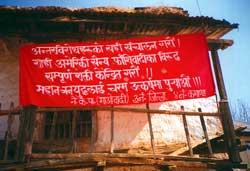 At any other time, in any other place, the brinkmanship the palace and parties are displaying could be construed as just plain politics. The argument is about the democratic process: did or didn't King Gyanendra act unconstitutionally to sack a prime minister in October 2002, and what should be done to restore the political status quo.
At any other time, in any other place, the brinkmanship the palace and parties are displaying could be construed as just plain politics. The argument is about the democratic process: did or didn't King Gyanendra act unconstitutionally to sack a prime minister in October 2002, and what should be done to restore the political status quo. Allowing this division to fester at a time when the country is teetering on the edge is gross recklessness. Such bizarre bickering is like wrestling on the balcony of a house that is on fire. Listening to their rhetoric and intemperate language, one would think that neither the king nor the party leaders are fully aware (or care) that the flames are licking at the floorboards and the balcony is on the verge of collapse. What point is a power struggle in which both sides will be consumed?
It is difficult to say who is more obdurate here. In Pokhara, the king proposed and the parties opposed. Earlier, the party leadership proposed a common candidate for prime minister, which the king opposed. How long can this tit-for-tat go on?
The people have not joined the political parties' agitation on the streets. The king seems to think this translates into support for his move. It doesn't. The people may not be able to articulate it, but they want a system that has their representation because it is the only way to lasting peace. And that means elections.
By their outright rejection of even the possibility of polls, the party leadership is painting itself needlessly into a corner. The parties still can't understand why the citizens are so disillusioned with them, they haven't figured out that for a majority of people the word 'democracy' is now synonymous with greed and power. The people's message is that they will not support the parties' anti-king agitation unless the politicians publicly admit their past blunders and demonstrate that they have truly reformed. So far, no signs of it. If their conscience won't allow them to patch up with the king, the parties could come up with ideas on restarting the peace process, showing they can be united in common cause to address the people's number one concern.
The Maoists have now gone beyond trying to woo public support. When asked why they are punishing a people who have already suffered enough, their leaders use the labour pain analogy. Giving birth is painful and dangerous, they say. But the way the revolution is headed, it is looking more and more like a still-born delivery where the mother also loses her life.
Assuming all three forces now realise that this is a dead-end, all three need to yield more. The Maoists must see time is not on their side: the longer this drags on, the more they need to use force, violence and abductions to get the people to obey their diktat. As for the party leadership and the king, the sooner they give up their stubborn one-upmanship and join forces the better it will be for them both, and for the Nepali people.


